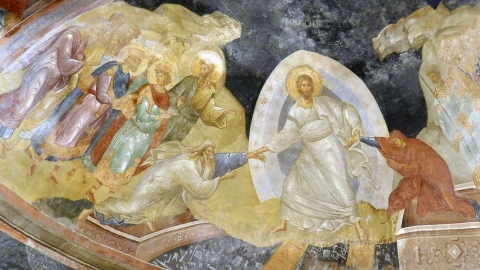The Humility of St. Joseph

Saint Joseph and the Child Jesus, Spanish Colonial School.
Some Saints are privileged to extend to us their patronage with particular efficacy in certain needs, but not in others; but our holy patron St. Joseph has the power to assist us in all cases, in every necessity and in every undertaking.
St. Joseph was the humble carpenter of Nazareth with a love for poverty who esteemed and loved labor, and who portrays the dignity of those who work to provide for their family. That God placed His Son in the care of St. Joseph is the supreme example of the worth the Almighty places honest work.
Pope Leo XIII wrote of St. Joseph In the encyclical Quamquam Pluries, “regularly by his work he earned what was necessary for the one and the other for nourishment and clothing…” Comparing St. Joseph to the Old Testament Joseph, Pope Leo continued:
And in truth, beyond the fact—the significance of which has never been denied—that the same name was given to both, you well know the points of likeness that exist between them: namely, that the first Joseph won the favor and special good will of his master, and that through Joseph's administration his household came to prosperity and wealth; that (still more important) he presided over the kingdom with great power, and in a time when the harvests failed, he provided for all the needs of the Egyptians with so much wisdom that the king decreed to him the title “savior of the world.”
Devotion to St. Joseph has been known since the 4th century, but mainly in the Eastern Church. In the west the devotion grew with the preaching of St. Bernard, St. Thomas Aquinas, St. Gertrude, and St. Bridget of Sweden. St. Thomas Aquinas wrote, “Some Saints are privileged to extend to us their patronage with particular efficacy in certain needs, but not in others; but our holy patron St. Joseph has the power to assist us in all cases, in every necessity and in every undertaking.”
In the 15th century Pope Sixtus IV introduced the feast of St. Joseph to the Roman Calendar. After that St. Joseph steadily acquired new devotees, until his cult was especially strengthened in the 16th century by the reformed Order of Carmelites. In 1562 St. Teresa of Avila, patroness of Spain, founded the little Monastery of St. Joseph of Avila, a convent of discalced Carmelite nuns of the primitive rule of St. Joseph devoted to solitude, silence, austerity, and poverty. The decision to name the convent for St. Joseph was influenced by his intercession to deliver Teresa from a serious illness in her youth. St. Teresa also chose St. Joseph’s as her place of retreat and refuge during the persecutions of the reformed order, when she was condemned to voluntary retirement. The Carmelite reformer wrote, “To other Saints Our Lord seems to have given power to succor us in some special necessity; but to this glorious Saint, I know by experience, He has given the power to help us in all needs.”
St. Thomas Aquinas, St. Teresa of Avila, Popes Pius XI and XII – all point to St. Joseph to remind us that it is in the solitude of the forgotten places that God reveals Himself to humble hearts.
Blessed are the poor in spirit – those who lead just lives free from idleness, who desire to remain hidden and work peaceably – for theirs is the kingdom of Heaven.

Prayer to St. Joseph
Pope St. Pius X composed the following prayer to St. Joseph, patron of working people, that expresses concisely the Christian attitude toward labor. It summarizes also for us the lessons of the Holy Family's work at Nazareth.
Glorious St. Joseph, model of all who devote their lives to labor, obtain for me the grace to work in a spirit of penance in order thereby to atone for my many sins; to work conscientiously, setting devotion to duty in preference to my own whims; to work with thankfulness and joy, deeming it an honor to employ and to develop by my labor the gifts I have received from God; to work with order, peace, moderation, and patience, without ever shrinking from weariness and difficulties; to work above all with a pure intention and with detachment from self, having always before my eyes the hour of death and the accounting which I must then render of time ill spent, of talents wasted, of good omitted, and of vain complacency in success, which is so fatal to the work of God. All for Jesus, all through Mary, all in imitation of you, O Patriarch Joseph! This shall be my motto in life and in death. Amen.





